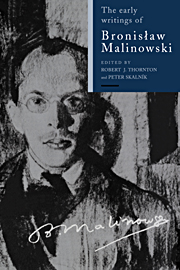Book contents
- Frontmatter
- Contents
- Preface
- Acknowledgements
- Note on the text
- Introduction: Malinowski's reading, writing, 1904–1914
- Malinowski's writings, 1904–1914
- 1 Observations on Friedrich Nietzsche's The Birth of Tragedy (1904/5)
- 2 On the principle of the economy of thought (1906)
- 3 Religion and magic: The Golden Bough (1910)
- 4 Totemism and exogamy (1911–1913)
- 5 Tribal male associations in Australia (1912)
- 6 The economic aspects of the intichiuma ceremonies (1912)
- 7 The relationship of primitive beliefs to the forms of social organization (1913)
- 8 A fundamental problem of religious sociology (1914)
- 9 Sociology of the family (1913–14)
- Notes
- References
- Index
8 - A fundamental problem of religious sociology (1914)
Published online by Cambridge University Press: 18 December 2009
- Frontmatter
- Contents
- Preface
- Acknowledgements
- Note on the text
- Introduction: Malinowski's reading, writing, 1904–1914
- Malinowski's writings, 1904–1914
- 1 Observations on Friedrich Nietzsche's The Birth of Tragedy (1904/5)
- 2 On the principle of the economy of thought (1906)
- 3 Religion and magic: The Golden Bough (1910)
- 4 Totemism and exogamy (1911–1913)
- 5 Tribal male associations in Australia (1912)
- 6 The economic aspects of the intichiuma ceremonies (1912)
- 7 The relationship of primitive beliefs to the forms of social organization (1913)
- 8 A fundamental problem of religious sociology (1914)
- 9 Sociology of the family (1913–14)
- Notes
- References
- Index
Summary
There are certain questions of principle in every branch of science which cannot be passed over in any comprehensive and thorough treatment of the subject, and upon the answer of which the further course of inquiry essentially depends.
Such questions are, as a rule, the most difficult to settle, because only an overwhelming amount of evidence gathered with the very problem in view allows of an unequivocal answer. In anthropology the mutual co-operation of the theorist and of the field-worker is essential in all such cases.
A question of this type presents itself at the outset in anthropological investigations of religion. Is there a sharp and deep cleavage between religious and profane matters among primitive peoples? Or, in other words: Is there pronounced dualism in the social and mental life of the savage, or, on the contrary, do the religious and non-religious ideas and activities pass and shade into each other in a continuous manner?
This question is of utmost importance for the general theory of religion. Professor Durkheim postulates the existence of a perfectly sharp and deep cleavage between the two domains of the sacré and profane, and his entire theoretical construction stands and falls with this assumption. Again, Dr Marett is of the opinion that, generally speaking, ‘the savage is very far from having any fairly definite system of ideas of a magico-religious kind, with a somewhat specialised department of conduct corresponding thereto’.
This view, although expressed in a somewhat different connection, undoubtedly implies the negation of Durkheim's dogmatic standpoint.
- Type
- Chapter
- Information
- The Early Writings of Bronislaw Malinowski , pp. 243 - 246Publisher: Cambridge University PressPrint publication year: 1993

